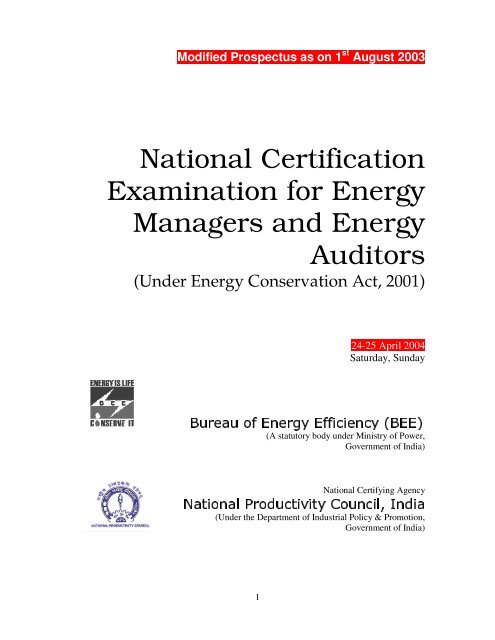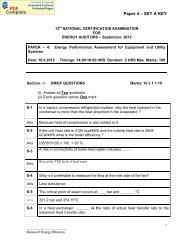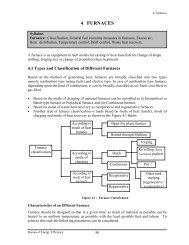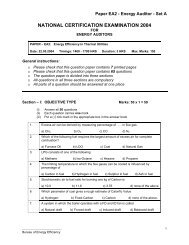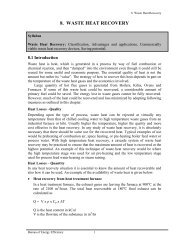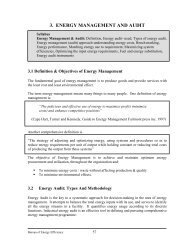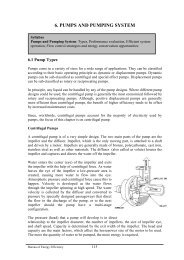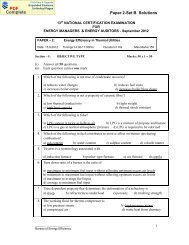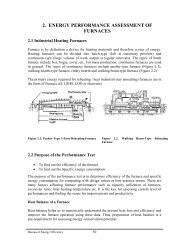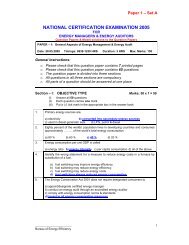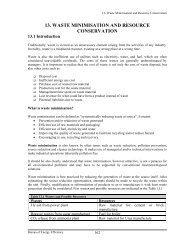National Certification Examination for Energy Managers and ...A ...
National Certification Examination for Energy Managers and ...A ...
National Certification Examination for Energy Managers and ...A ...
You also want an ePaper? Increase the reach of your titles
YUMPU automatically turns print PDFs into web optimized ePapers that Google loves.
Modified Prospectus as on 1 st August 2003<br />
<strong>National</strong> <strong>Certification</strong><br />
<strong>Examination</strong> <strong>for</strong> <strong>Energy</strong><br />
<strong>Managers</strong> <strong>and</strong> <strong>Energy</strong><br />
Auditors<br />
(Under <strong>Energy</strong> Conservation Act, 2001)<br />
24-25 April 2004<br />
Saturday, Sunday<br />
©¥£ ! "$#&%¤%('<br />
¢¡¤£¦¥¨§©¡<br />
(A statutory body under Ministry of Power,<br />
Government of India)<br />
<strong>National</strong> Certifying Agency<br />
A+/37¤09-B2DCFEG06H-I*<br />
)+*,.-/10*32¤4¨5/¨6879:,;-=,@?<br />
(Under the Department of Industrial Policy & Promotion,<br />
Government of India)<br />
1
“What we know is only h<strong>and</strong>ful<br />
What we don’t know is oceanful”<br />
- Avvaiyar, Tamil poet, 2 AD.<br />
J+KLNMPO©LM@Q<br />
Foreword<br />
1. Background<br />
2. Need <strong>for</strong> <strong>National</strong> Level <strong>Certification</strong> <strong>Examination</strong><br />
3. <strong>Energy</strong> Auditor – Role <strong>and</strong> importance<br />
4. <strong>Energy</strong> Manager – Role <strong>and</strong> importance<br />
5. Eligibility Criteria <strong>for</strong> the C<strong>and</strong>idates<br />
6. <strong>Examination</strong> Papers <strong>and</strong> scheme<br />
7. Minimum Marks <strong>for</strong> Award of Certificates<br />
8. Supplementary c<strong>and</strong>idates<br />
9. Validity of Certificates<br />
10. Revocation of Certificates<br />
11. <strong>Examination</strong> Centres<br />
12. <strong>Examination</strong> Schedule<br />
13. Fee<br />
14. Course books<br />
15. Registration <strong>and</strong> <strong>Certification</strong><br />
16. Role of the <strong>National</strong> Certifying Agency<br />
17. <strong>Energy</strong> Intensive Industries listed as designated<br />
consumers<br />
18. Instructions to the c<strong>and</strong>idates<br />
Annexure –I: Syllabus<br />
2
Foreword<br />
The magnitude of energy consumption has always been taken as an indicator of<br />
development status of any economy. However, what actually a country requires is not<br />
energy per se but the services that energy provides. A nation can increase the service by<br />
keeping the same inefficient device <strong>and</strong> pump in more energy. More energy will positively<br />
not accelerate the economic growth as long as economy has high-energy intensity. India’s<br />
energy intensity per unit of GDP is higher by 3.7 times of Japan, 1.4 times of Asia <strong>and</strong> 1.5<br />
times of USA, indicating to very high energy wastage. In the globalized economy,<br />
countries with high energy intensity may become uncompetitive due to high energy input<br />
cost. There<strong>for</strong>e, energy cost reduction must become one of the important benchmarks <strong>for</strong><br />
economic success. Efficiency in consumption of energy <strong>and</strong> its conservation would be one<br />
of the most important means of energy cost reduction <strong>and</strong> also <strong>for</strong> meeting future energy<br />
dem<strong>and</strong>.<br />
There is a huge scope of energy saving in the country. Various studies undertaken<br />
suggest substantial energy saving potential in industrial, commercial <strong>and</strong> domestic sector.<br />
Efficient use of energy provides the least cost <strong>and</strong> environmentally friendly option <strong>for</strong><br />
capacity creation in the shortest time frame. <strong>Energy</strong> efficiency also assumes further<br />
importance as “one unit of energy saved at consumer end, avoids 3 units of fresh<br />
capacity addition”.<br />
With the background of high energy saving potential <strong>and</strong> its benefits, bridging the<br />
gap between dem<strong>and</strong> <strong>and</strong> supply, reducing environmental emissions through energy saving,<br />
<strong>and</strong> to effectively overcome the barrier, the Government of India has enacted the <strong>Energy</strong><br />
Conservation Act 2001. The Act provides the much-needed legal framework <strong>and</strong><br />
institutional arrangement <strong>for</strong> embarking on an energy efficiency drive.<br />
Under the provisions of the Act, Bureau of <strong>Energy</strong> Efficiency has been established<br />
with effect from 1 st March, 2002. The Bureau would be responsible <strong>for</strong> implementation of<br />
policy, programmes <strong>and</strong> coordination of energy conservation activities in the country.<br />
Bureau is in the process of accrediting <strong>Energy</strong> Audit firms who would provide<br />
quality energy auditing services to the industry. <strong>Energy</strong> audit involves a systematic study<br />
undertaken on major energy consuming sections <strong>and</strong> equipment including construction of<br />
heat <strong>and</strong> mass balance with a view to identify the flow of energy, utilization efficiency of<br />
energy in each of the steps <strong>and</strong> pin-point energy wastages. A well-conducted energy audit<br />
would reveal the areas of wastage of energy <strong>and</strong> it would be possible to suggest<br />
countermeasures <strong>for</strong> saving of energy. The EC Act requires that energy audit report to<br />
contain recommendations <strong>for</strong> improving energy efficiency with cost- benefit analysis <strong>and</strong><br />
an action plan to reduce energy consumption (Clause 2(i)). The conduct of energy audit<br />
through an accredited energy auditing firm (having a pool of certified energy auditors) <strong>and</strong><br />
implementation of its recommendations on cost-benefit basis is expected to help the<br />
industry to achieve significant reduction in their energy consumption levels.<br />
Bureau of <strong>Energy</strong> Efficiency is also strengthening the capabilities of <strong>Energy</strong><br />
<strong>Managers</strong> to be appointed by the energy intensive industry under the EC Act. <strong>Energy</strong><br />
manager occupies an important position <strong>and</strong> is a focal point of all the activities pertaining<br />
3
to energy management in the organization. <strong>Energy</strong> Manager provides leadership in the<br />
development of policy on <strong>Energy</strong> Management Action Plan <strong>and</strong> plays a key role in the<br />
<strong>for</strong>mulation of corporate energy policy. <strong>Energy</strong> <strong>Managers</strong> also per<strong>for</strong>m the activities<br />
related with Plant <strong>Energy</strong> Management; Project Management; Personnel Management <strong>and</strong><br />
Financial Management at plant level. He also prepares the in<strong>for</strong>mation to be submitted to<br />
the Designated Agency with regard to the energy consumed <strong>and</strong> action taken on the<br />
recommendation of the Accredited <strong>Energy</strong> Auditing firm.<br />
The BEE will make every endeavor to develop adequate technical capacity in the<br />
<strong>Energy</strong> <strong>Managers</strong> to enable them to effectively discharge the m<strong>and</strong>atory duties &<br />
responsibilities assigned under the Regulation to the Act. The Bureau is developing<br />
manuals <strong>and</strong> codes <strong>for</strong> conduct of energy audit of different equipment <strong>and</strong> appliances to get<br />
optimal per<strong>for</strong>mance result. Further, the BEE will periodically collect the best energy<br />
saving practices followed in different industries <strong>and</strong> post the same on its website<br />
www.energymanagertraining.com to enable the <strong>Energy</strong> Manager to know the innovative<br />
approaches adopted elsewhere <strong>and</strong> try out the same. The website will also have the <strong>for</strong>mat<br />
of supply of m<strong>and</strong>atory in<strong>for</strong>mation relating to energy consumption of key activities.<br />
Furnishing the in<strong>for</strong>mation will help the industrial unit to know its position in term of<br />
energy consumption in different activities vis-à-vis other industries in the same sector.<br />
<strong>Energy</strong> Manager may as well test their knowledge through an interactive self test at the<br />
website. In other words, this will help the industry an automatic access to benchmarking<br />
within the sector.<br />
Taking into consideration the important role that an <strong>Energy</strong> Manager <strong>and</strong> an <strong>Energy</strong><br />
Auditor will play, BEE is specifying qualification procedures <strong>for</strong> a person to become a<br />
qualified <strong>Energy</strong> Manager <strong>and</strong> <strong>Energy</strong> Auditor under the EC Act, 2001, will be passing of a<br />
<strong>National</strong> level <strong>Certification</strong> <strong>Examination</strong> under the aegis of BEE. To facilitate conduct of<br />
the <strong>National</strong> level certification examination, BEE has designated <strong>National</strong> Productivity<br />
Council (NPC) as the national certifying agency. In order to facilitate the conduct of the<br />
certification examination, the Bureau of <strong>Energy</strong> Efficiency (BEE) has developed a<br />
comprehensive syllabus <strong>and</strong> course material. The details of the certification procedure,<br />
contents <strong>and</strong> other guidance have been laid down in this Prospectus. The certification<br />
programme helps you <strong>and</strong> the Indian industries in achieving our national objective of<br />
increasing the efficient use of energy.<br />
I trust that the implementation of m<strong>and</strong>atory energy audit <strong>and</strong> energy management<br />
programme by the designated consumers would contribute towards building an energy<br />
efficient economy.<br />
(SHASHI SHEKHAR)<br />
Director General<br />
Bureau of <strong>Energy</strong> Efficiency<br />
4
1. Background<br />
The Government of India has en<strong>for</strong>ced The <strong>Energy</strong> Conservation Act, 2001 (No 52 OF<br />
2001, 29 th September 2001) with effect from 1 st March 2002. The Act provides mainly <strong>for</strong><br />
efficient use of energy <strong>and</strong> its conservation <strong>and</strong> <strong>for</strong> matters connected therewith or<br />
incidental thereto. As per the <strong>Energy</strong> Conservation Act 2001, it is m<strong>and</strong>atory <strong>for</strong> all the<br />
designated energy consumers to get energy audit conducted by an Accredited <strong>Energy</strong><br />
Auditor [under clause 14(h) <strong>and</strong> 14(i)] <strong>and</strong> to designate or appoint an <strong>Energy</strong> Manager<br />
[under clause 14(l)]. The designated energy consumers as covered in the Schedule to the<br />
<strong>Energy</strong> Conservation Act are given in item No17 of this prospectus.<br />
Bureau of <strong>Energy</strong> Efficiency (BEE), Ministry of Power, Government of India, is<br />
empowered to specify the regulations <strong>and</strong> mechanism to meet the above objectives. BEE<br />
has retained the <strong>National</strong> Productivity Council (NPC) as the <strong>National</strong> Certifying<br />
Agency, which would conduct the <strong>National</strong> Level <strong>Certification</strong> <strong>Examination</strong> <strong>for</strong> <strong>Energy</strong><br />
<strong>Managers</strong> & <strong>Energy</strong> Auditors under the ageis of Bureau.<br />
2. Need <strong>for</strong> <strong>National</strong> Level <strong>Certification</strong> <strong>Examination</strong><br />
The essential qualification <strong>for</strong> a certified energy manager <strong>and</strong> certified energy auditor<br />
would be the passing of a <strong>National</strong> Level <strong>Certification</strong> <strong>Examination</strong> which will be<br />
conducted under the aegis of Bureau of <strong>Energy</strong> Efficiency. The national level certification<br />
examination, conducted by a <strong>National</strong> Certifying Agency, will establish a uni<strong>for</strong>m criterion<br />
<strong>for</strong> the certification of energy managers/energy auditors <strong>and</strong> will also ensure that services<br />
of qualified persons, having the requisite knowledge on the subject, are available to the<br />
industry.<br />
The <strong>Certification</strong> examination will be conducted based on the syllabus/curriculum<br />
approved by the Bureau. The proposed syllabus will go under modifications from time to<br />
time based on the feed back received <strong>and</strong> future new developments. The requisite<br />
modifications will be incorporated by the national level certification agency in the syllabus<br />
in consultation with the Bureau from time to time.<br />
3. <strong>Energy</strong> Auditor – Role <strong>and</strong> importance<br />
<strong>Energy</strong> audit involves a systematic study undertaken on major energy consuming sections<br />
<strong>and</strong> equipments including construction of heat <strong>and</strong> mass balance with a view to identify the<br />
flow of energy, utilization efficiency of energy in each of the steps <strong>and</strong> pin-point wasteful<br />
energy used. A well-conducted energy audit would reveal the areas of wastage of energy<br />
<strong>and</strong> it would be possible to suggest saving of energy.<br />
The <strong>Energy</strong> Conservation Act requires the energy audit report to contain recommendations<br />
<strong>for</strong> improving energy efficiency with cost benefit analysis <strong>and</strong> an action plan to reduce<br />
energy consumption [Clause 14(i)]. The conduct of energy audit <strong>and</strong> implementation of its<br />
recommendations on cost-benefit basis through accredited energy auditors is expected to<br />
help the designated energy consumers to achieve significant reduction in their energy<br />
consumption levels.<br />
5
Responsibilities <strong>and</strong> duties of <strong>Energy</strong> Auditor are highlighted below<br />
• Carry out a detailed energy audit<br />
• Quantify energy consumption <strong>and</strong> establish base line energy in<strong>for</strong>mation<br />
• Construct energy <strong>and</strong> material balance<br />
• Per<strong>for</strong>m efficiency evaluation of energy & utility systems<br />
• Compare energy norms with existing energy consumption levels<br />
• Identify <strong>and</strong> prioritization of energy saving measures<br />
• Analysis of technical <strong>and</strong> financial feasibility of energy saving measures<br />
• Recommend energy efficient technologies <strong>and</strong> alternate energy sources<br />
• Report writing, presentation <strong>and</strong> follow up <strong>for</strong> implementation<br />
4. <strong>Energy</strong> Manager – Role & Importance<br />
<strong>Energy</strong> manager occupies an important position <strong>and</strong> is a focal point of all the activities<br />
pertaining to energy management in the organization. The energy manager provides<br />
leadership in the development of policy on <strong>Energy</strong> Management Action Plan <strong>and</strong> plays a<br />
key role in the <strong>for</strong>mulation of corporate energy policy. <strong>Energy</strong> managers also per<strong>for</strong>m the<br />
activities related with Plant <strong>Energy</strong> Management, Project Management, Personnel<br />
Management <strong>and</strong> Financial Management at the plant level. He also prepares the<br />
in<strong>for</strong>mation to be submitted to the Designated Agency with regard to the energy consumed<br />
<strong>and</strong> action taken on the recommendation of the accredited energy auditor [Clause 14(k)].<br />
Responsibilities <strong>and</strong> duties of <strong>Energy</strong> manager are highlighted below<br />
• Establish an energy conservation cell & prepare an annual activity plan<br />
• Develop <strong>and</strong> manage training programme <strong>for</strong> energy efficiency at operating levels.<br />
• Develop integrated system of energy efficiency <strong>and</strong> environmental improvement.<br />
• Initiate activities to improve monitoring <strong>and</strong> process control to reduce energy costs.<br />
• Co-ordinate implementation of energy audit/efficiency improvement projects through<br />
external agencies.<br />
• Establish / participate in in<strong>for</strong>mation exchange with other energy managers of the same<br />
sector through association.<br />
• Provide in<strong>for</strong>mation to BEE <strong>and</strong> Designated Agency of the respective states as<br />
dem<strong>and</strong>ed in the Act<br />
5. Eligibility Criteria <strong>for</strong> the C<strong>and</strong>idates.<br />
The c<strong>and</strong>idates appearing <strong>for</strong> this examination should have the following eligibility criteria<br />
<strong>and</strong> requisite work experience to write the <strong>Certification</strong> examination:<br />
a) For <strong>Energy</strong> <strong>Managers</strong>:<br />
C<strong>and</strong>idates appearing <strong>for</strong> <strong>Energy</strong> <strong>Managers</strong> certification examination should possess<br />
any one of the following qualifications: -<br />
i. Graduate Engineer (B.E / B.Tech) or equivalent with 3 years of work experience.<br />
ii. Post Graduate Engineer (M.E / M.Tech) or equivalent with 2 years of work<br />
experience<br />
6
iii. Graduate Engineer with Post Graduate degree in Management or equivalent<br />
with 2 years of work experience<br />
iv. Diploma Engineer or equivalent with 6 years of work experience<br />
v. Post Graduate in Science with 5 years of work experience.<br />
b) For <strong>Energy</strong> Auditors:<br />
C<strong>and</strong>idates appearing <strong>for</strong> <strong>Energy</strong> Auditors certification examination should possess<br />
any one of the following qualifications: -<br />
i. Graduate Engineer (B.E / B.Tech) or equivalent with 3 years of work<br />
experience.<br />
ii. Post Graduate Engineer (M.E / M.Tech) or equivalent with 2 years of work<br />
experience<br />
iii. Graduate Engineer with Post Graduate degree in Management or<br />
equivalent with 2 years of work experience.<br />
c) For c<strong>and</strong>idates without requisite work experiences<br />
i. The c<strong>and</strong>idates possessing the requisite qualification but without<br />
requisite experiences are also eligible <strong>for</strong> appearing in written examination<br />
<strong>for</strong> <strong>Energy</strong> Manager or <strong>Energy</strong> Auditor as applicable.<br />
ii. <strong>Certification</strong> of <strong>Energy</strong> Manager will be done only on successful passing of<br />
the examination <strong>and</strong> acquiring relevant experience <strong>and</strong> submission of<br />
experience certificate.<br />
iii. <strong>Certification</strong> of <strong>Energy</strong> Auditor will be done on successful passing of the<br />
theory examination <strong>and</strong> acquiring relevant experience. These c<strong>and</strong>idates<br />
will have to first pass the theory papers <strong>and</strong> Viva-voce examination will be<br />
conducted once the proof <strong>for</strong> work experience is submitted. There will be<br />
no extra fee required to be paid <strong>for</strong> the Viva-voce examination.<br />
iv. The requisite experiences as applicable should be acquired within 6 years<br />
from the date of appearing in the first examination.<br />
6. <strong>Examination</strong> Papers <strong>and</strong> Scheme<br />
The examination Papers <strong>for</strong> energy mangers <strong>and</strong> <strong>Energy</strong> Auditors are given below:<br />
a) For <strong>Certification</strong> of <strong>Energy</strong> <strong>Managers</strong><br />
Paper No Name of the Paper<br />
Duration Max Marks<br />
EM-1<br />
General Aspects of <strong>Energy</strong> Management<br />
& <strong>Energy</strong> Audit.<br />
3 Hrs 150<br />
EM-2 <strong>Energy</strong> Efficiency in Thermal Utilities 3Hrs 150<br />
EM-3 <strong>Energy</strong> Efficiency in Electrical Utilities 3 Hrs 150<br />
Total Marks 450<br />
The c<strong>and</strong>idate has to pass all the above THREE papers, viz., EM-1, EM-2<br />
<strong>and</strong> EM-3 <strong>and</strong> obtain a minimum of 50% of the maximum marks in each paper.<br />
7
) For <strong>Certification</strong> of <strong>Energy</strong> Auditors<br />
Paper No Name of the Paper<br />
Duration Max Marks<br />
EA-1<br />
General Aspects of <strong>Energy</strong> Management<br />
& <strong>Energy</strong> Audit.<br />
3 Hrs 150<br />
EA-2 <strong>Energy</strong> Efficiency in Thermal Utilities 3 Hrs 150<br />
EA-3 <strong>Energy</strong> Efficiency in Electrical Utilities 3 Hrs 150<br />
EA-4<br />
<strong>Energy</strong> Per<strong>for</strong>mance Assessment <strong>for</strong><br />
Equipment <strong>and</strong> Utility systems (Open 2 Hrs. 100<br />
Book <strong>Examination</strong>)<br />
Viva Voce 15 Mts. 50<br />
Total Marks 600<br />
The c<strong>and</strong>idate has to pass all the above FOUR papers <strong>and</strong> obtain a minimum of 50%<br />
of the maximum marks in each paper. In addition, the c<strong>and</strong>idate should also appear <strong>for</strong><br />
a Viva Voce <strong>Examination</strong> <strong>and</strong> obtain a minimum of 50% of the maximum marks.<br />
c) Medium of examination is English.<br />
d) The examination type is comprised of both objective <strong>and</strong> descriptive types.<br />
e) Question Paper <strong>for</strong> <strong>Energy</strong> Manager is different from that <strong>for</strong> the <strong>Energy</strong><br />
Auditors <strong>and</strong> degree of difficulty level <strong>for</strong> <strong>Energy</strong> Auditors is higher than <strong>Energy</strong><br />
Manager examination.<br />
f) The EA-4 paper <strong>for</strong> <strong>Energy</strong> Auditors will be an open book examination <strong>and</strong> the<br />
c<strong>and</strong>idates can refer to books during the examination.<br />
g) Viva-voce examination <strong>for</strong> <strong>Energy</strong> Auditors will be conducted only <strong>for</strong> those<br />
c<strong>and</strong>idates who have obtained minimum of 50% of the maximum marks in all the<br />
papers viz. EA1, EA2, EA3 & EA4. Proposed date <strong>for</strong> Viva-voce examination to such<br />
c<strong>and</strong>idates will be intimated later.<br />
h) The syllabus <strong>for</strong> all the papers is given in Annexure – I.<br />
7. Minimum Marks <strong>for</strong> Award of Certificates<br />
a) For <strong>Certification</strong> of <strong>Energy</strong> <strong>Managers</strong>:<br />
i. 50% of the maximum marks in each paper in EM-1, EM-2 <strong>and</strong> EM-3.<br />
b) For <strong>Certification</strong> of <strong>Energy</strong> Auditors:<br />
i. 50% of the maximum marks in each paper in EA-1, EA-2 <strong>and</strong> EA-3 & EA-4<br />
ii. A c<strong>and</strong>idate appearing <strong>for</strong> <strong>Energy</strong> Auditor examination is also required to<br />
appear <strong>for</strong> a Viva Voce <strong>Examination</strong> <strong>and</strong> obtain a minimum of 50% of the<br />
maximum marks.<br />
Note: A c<strong>and</strong>idate qualifying as Certified <strong>Energy</strong> Auditor automatically qualifies <strong>for</strong><br />
Certified <strong>Energy</strong> Manager as well. Such persons can be appointed or<br />
8
designated as <strong>Energy</strong> Manager under the EC Act, 2001 by the Designated<br />
Consumers.<br />
8. Supplementary C<strong>and</strong>idates<br />
Those c<strong>and</strong>idates who could not appear /pass in any paper or viva-voce are eligible to<br />
write the supplementary examination within a period of two years from the date of<br />
conduct of first examination. Exemption to the c<strong>and</strong>idate is given <strong>for</strong> a particular<br />
paper, if he/she secures equal or more than 50% of the maximum marks in that paper.<br />
The validity of the exemption is <strong>for</strong> three attempts or <strong>for</strong> two years whichever is earlier.<br />
In the supplementary examination, the c<strong>and</strong>idate has to secure a minimum of 50% of<br />
the maximum marks <strong>for</strong> qualifying in the examination.<br />
9. Validity of Certificates<br />
The certificate is valid <strong>for</strong> life time, subject to the condition of attending of an<br />
authorized refresher training course of short term duration (5days) by the c<strong>and</strong>idate in a<br />
designated /approved institute or organization (to be announced by the Bureau) once in<br />
a 5 year time period, commencing from the date of award of certificate. A six- month’s<br />
grace period will also be provided to the certified energy manager <strong>and</strong> energy auditors<br />
after the expiry of 5 year period. The C<strong>and</strong>idate will be required to in<strong>for</strong>m the BEE<br />
about the attendance of the refresher course on a specified <strong>for</strong>mat so that a fresh<br />
certificate is issued to the c<strong>and</strong>idate <strong>for</strong> another 5-year period<br />
10. Revocation of Certificates<br />
The Certificate can be revoked on the ground of proved instances of unprofessional /<br />
unethical practices followed by a Certified <strong>Energy</strong> Manager. The Bureau shall constitute a<br />
Committee <strong>for</strong> this purpose, which will investigate the matter. The concerned Certified<br />
<strong>Energy</strong> Manager will be in<strong>for</strong>med of the charges against him <strong>and</strong> given a reasonable<br />
opportunity of being heard in respect of such charges.<br />
11. <strong>Examination</strong> Centres<br />
a) The proposed centers <strong>for</strong> conduct of the written examination are: –<br />
Ahmedabad, Bangalore, Bhopal, Bhubaneswar, Ch<strong>and</strong>igarh, Chennai,<br />
Dehradun, New Delhi, Goa, Guwahati, Hyderabad, Jaipur, Kanpur, Kolkatta,<br />
Mumbai, Nagpur, Patna, Raipur, Thiruvananthapuram <strong>and</strong> Vadodara.<br />
b) Proposed centers <strong>for</strong> Viva-voce examination <strong>for</strong> <strong>Energy</strong> Auditors are:<br />
- New Delhi, Mumbai, Kolkatta & Chennai<br />
c) The applicants will have to give three choices of examination centers in order of their<br />
Preference.<br />
d) If the number of applicants <strong>for</strong> a particular center is found to be less than the minimum<br />
required number, the examination center <strong>for</strong> those applicants can be shifted to next<br />
preferred centers.<br />
9
12. <strong>Examination</strong> Schedule<br />
Schedule of <strong>Examination</strong> <strong>for</strong> <strong>Energy</strong> <strong>Managers</strong><br />
Paper No. <strong>Examination</strong> Paper <strong>Examination</strong> Date Time<br />
General Aspects of <strong>Energy</strong><br />
EM-1 Management & <strong>Energy</strong> Audit. 24 th April 2004 0930-1230 Hrs<br />
EM-2<br />
EM-3<br />
<strong>Energy</strong> Efficiency in Thermal<br />
Utilities<br />
<strong>Energy</strong> Efficiency in Electrical<br />
Utilities<br />
24 th April 2004 1400-1700 Hrs<br />
25 th April 2004 0930-1230 Hrs<br />
Schedule of <strong>Examination</strong> <strong>for</strong> <strong>Energy</strong> Auditors<br />
Paper No. <strong>Examination</strong> Paper <strong>Examination</strong> Date Time<br />
General Aspects of <strong>Energy</strong><br />
EA-1 Management & <strong>Energy</strong> Audit. 24 th April 2004 0930-1230 Hrs<br />
EA-2<br />
EA-3<br />
EA-4<br />
<strong>Energy</strong> Efficiency in Thermal<br />
Utilities<br />
<strong>Energy</strong> Efficiency in Electrical<br />
Utilities<br />
<strong>Energy</strong> Per<strong>for</strong>mance Assessment<br />
<strong>for</strong> Equipment <strong>and</strong> Utility systems<br />
(open book examination)<br />
24 th April 2004 1400 –1700 Hrs<br />
25 th April 2004 0930-1230 Hrs<br />
25 th April 2004 1400 –1600 Hrs<br />
Viva-voce Viva voce <strong>Examination</strong>* * *<br />
* The date, timings <strong>and</strong> venue <strong>for</strong> Viva-voce examination will be intimated later on to the<br />
successful c<strong>and</strong>idates of the written examinations.<br />
13. Fee<br />
Fee <strong>for</strong> <strong>Certification</strong> examination of <strong>Energy</strong> <strong>Managers</strong> or <strong>Energy</strong> Auditors are given<br />
below :<br />
Prospectus <strong>and</strong> application fee (<strong>for</strong> sponsored <strong>and</strong> Self-Sponsored individual c<strong>and</strong>idate)<br />
= Rs.500/-<br />
*Self-sponsored c<strong>and</strong>idates (individual in the category of SC/ST/OBC & having annual<br />
income not more than Rs. 1.0 Lakh/annum) = Rs. 250/-<br />
* The c<strong>and</strong>idate will be required to submit the copies of the necessary supporting documents.<br />
10
R<br />
R<br />
R<br />
<strong>Certification</strong> Fee <strong>for</strong> <strong>Energy</strong> <strong>Managers</strong> & <strong>Energy</strong> Auditors (Non-refundable)<br />
a) Sponsored c<strong>and</strong>idates by the company = Rs.20, 000/- (Twenty Thous<strong>and</strong> only)<br />
b) Self-sponsored c<strong>and</strong>idates (individual) = Rs.10, 000/- (Ten Thous<strong>and</strong> only)<br />
*c) Self-sponsored c<strong>and</strong>idates (individual in the category of SC/ST/OBC & having<br />
annual income not more than Rs. 1.0 Lakh/annum) = Rs. 5, 000/- (Five Thous<strong>and</strong> only)<br />
(The certification fee includes the cost of Course Books, examination fee, viva-voce fee & <strong>Certification</strong>.)<br />
* The c<strong>and</strong>idate will be required to submit the copies of the necessary supporting documents.<br />
Application <strong>and</strong> Prospectus can be down loaded from the website also. However,<br />
filled up application <strong>for</strong>m should be sent along with the application fee of Rs.500/-<br />
(Five Hundred only) or as applicable in addition to <strong>Certification</strong> <strong>Examination</strong> Fee<br />
as mentioned above.<br />
<strong>Certification</strong> <strong>Examination</strong> Fee is to be paid by DD drawn in favour of “Bureau of<br />
<strong>Energy</strong> Efficiency “payable at “Chennai” along with Application Form <strong>for</strong><br />
Registration.<br />
Supplementary <strong>Examination</strong> & Viva-voce fee structure:<br />
Fee <strong>for</strong> each paper (written examination)<br />
a) Sponsored c<strong>and</strong>idates by the company = Rs.3, 000/- (Three Thous<strong>and</strong> only)<br />
b) Self-sponsored c<strong>and</strong>idates (individual) = Rs.2, 000/- (Two Thous<strong>and</strong> only)<br />
*c) Self-sponsored c<strong>and</strong>idates (individual in the category of SC/ST/OBC & having<br />
annual income not more than Rs. 1.0 Lakh/annum) = Rs. 1, 000/- (One Thous<strong>and</strong> only)<br />
Fee <strong>for</strong> Viva-voce examination<br />
a)Both <strong>for</strong> company & self-sponsored c<strong>and</strong>idates = Rs.1, 000/- (One Thous<strong>and</strong> only)<br />
*b) Self-sponsored c<strong>and</strong>idates (individual in the category of SC/ST/OBC & having<br />
annual income not more than Rs. 1.0 Lakh/annum) = Rs. 500/- (Five Hundred only)<br />
14. Course Book<br />
The following Course Books are specially developed <strong>for</strong> the c<strong>and</strong>idates appearing<br />
<strong>for</strong> the examination .<br />
Paper-1: General Aspects of <strong>Energy</strong> Management & <strong>Energy</strong> Audit<br />
Paper-2: <strong>Energy</strong> Efficiency in Thermal Utilities<br />
Paper-3: <strong>Energy</strong> Efficiency in Electrical Utilities<br />
Paper-4: <strong>Energy</strong> Per<strong>for</strong>mance Assessment <strong>for</strong> Equipment <strong>and</strong> Utility Systems.<br />
The Course books <strong>for</strong> <strong>Energy</strong> Auditors <strong>and</strong> <strong>Energy</strong> <strong>Managers</strong> will be sent to all<br />
c<strong>and</strong>idates on registration.<br />
15. Registrations <strong>and</strong> <strong>Certification</strong> Process<br />
• Registration <strong>for</strong> the certification <strong>Examination</strong> will be done on receipt of the<br />
filled up application <strong>for</strong>m along with requisite fees from the c<strong>and</strong>idates<br />
11
• Registration No. will be allotted on scrutiny of application <strong>for</strong>m <strong>and</strong> the same<br />
will be intimated through Acknowledgement Card.<br />
• Course Books will be dispatched by post or courier to all the registered<br />
c<strong>and</strong>idates.<br />
• Hall Tickets will be issued to the c<strong>and</strong>idates one month be<strong>for</strong>e the<br />
commencement of the examination.<br />
• The results of the written examination will be communicated to all the<br />
c<strong>and</strong>idates<br />
• Intimation letters <strong>for</strong> Viva-voce examination will be sent separately <strong>for</strong> the<br />
successful c<strong>and</strong>idates of the <strong>Energy</strong> auditor written examination.<br />
• Certificates <strong>and</strong> credentials will be awarded to the successfully passed eligible<br />
c<strong>and</strong>idates.<br />
16. Role of NPC as The <strong>National</strong> Certifying Agency<br />
The Bureau of <strong>Energy</strong> Efficiency has retained the <strong>National</strong> Productivity Council (NPC) as<br />
the <strong>National</strong> Certifying Agency, which would conduct the <strong>National</strong> Level <strong>Certification</strong><br />
<strong>Examination</strong> <strong>for</strong> <strong>Energy</strong> <strong>Managers</strong> & <strong>Energy</strong> Auditors.<br />
NPC will carry out the following activities as a <strong>National</strong> Certifying Agency:-<br />
1) A Board of <strong>Examination</strong>s will be constituted <strong>for</strong> the overall supervision <strong>and</strong><br />
administration of the conduct of the Certifying <strong>Examination</strong>s <strong>for</strong> the<br />
<strong>Certification</strong> of <strong>Energy</strong> Auditors <strong>and</strong> <strong>Energy</strong> <strong>Managers</strong>.<br />
2) Dr. Ambedkar Institute of Productivity (AIP), Chennai, the Training Institute of<br />
NPC, will carry out all the activities <strong>for</strong> the conduct of the Certifying<br />
<strong>Examination</strong>s. A team of Officers <strong>and</strong> Staff will be located at Chennai <strong>and</strong> the<br />
<strong>Examination</strong>s will be administered <strong>and</strong> coordinated from Chennai. The<br />
Director (AIP) will be the Controller of <strong>Examination</strong>.<br />
3) NPC will receive <strong>and</strong> process the applications from the c<strong>and</strong>idates <strong>and</strong> register<br />
them as per the laid down procedures.<br />
4) NPC will send all necessary instructions in respect of the Certifying<br />
<strong>Examination</strong> <strong>and</strong> other details such as the Venue of examination, timings, code<br />
of conduct <strong>for</strong> the c<strong>and</strong>idates who are registered <strong>for</strong> the examination <strong>for</strong> <strong>Energy</strong><br />
<strong>Managers</strong> as well as <strong>Energy</strong> Auditors.<br />
5) NPC will administer the examination in all the centers.<br />
6) NPC would issue the Certificates <strong>and</strong> Credentials under the seal of Bureau of<br />
<strong>Energy</strong> Efficiency, a statutory body under Ministry of Power, Government of<br />
India to the successfully passed eligible c<strong>and</strong>idates.<br />
17. <strong>Energy</strong> Intensive Industries <strong>and</strong> other establishments<br />
listed as Designated Consumers in the Schedule to the<br />
<strong>Energy</strong> Conservation Act, 2001<br />
12
1. Aluminium<br />
2. Fertilizers<br />
3. Iron <strong>and</strong> Steel<br />
4. Cement<br />
5. Pulp <strong>and</strong><br />
paper<br />
6. Chlor Akali<br />
7. Sugar<br />
8. Textile<br />
9. Chemicals<br />
10. Railways<br />
11. Port Trust<br />
12. Transport Sector (industries <strong>and</strong> services)<br />
13. Petrochemicals, Gas Crackers, Naphtha<br />
Crackers<br />
<strong>and</strong> Petroleum Refineries<br />
14. Thermal Power Stations, hydel power<br />
stations,<br />
electricity transmission companies <strong>and</strong><br />
distribution companies<br />
15. Commercial buildings or establishment<br />
18. Instructions to the C<strong>and</strong>idates<br />
1. Read the prospectus <strong>and</strong> application <strong>for</strong>m completely.<br />
2. All entries should be neatly filled. Please tick (√) at the appropriate boxes.<br />
3. Attach proof of date of birth.<br />
4. Attach proof of work experience certificate as per the eligibility criteria.<br />
5. Attach a Photostat copy of Degree/Diploma certificate as per the eligibility<br />
criteria.<br />
6. Affix self-attested recent passport size photograph in application <strong>for</strong>m <strong>and</strong> hall<br />
ticket in duplicate.<br />
7. Enclose Dem<strong>and</strong> draft towards examination fee in favor of Bureau of <strong>Energy</strong><br />
Efficiency payable at Chennai.<br />
8. Self-sponsored c<strong>and</strong>idates (individual in the category of SC/ST/OBC & having<br />
annual income not more than Rs. 1.0 Lakh/annum) will be required to submit<br />
the attested copies of the necessary supporting documents.<br />
9. Filled application <strong>for</strong>m along with requisite fee should reach on or be<strong>for</strong>e<br />
30 th September 2003 to: -<br />
Director<br />
Dr. Ambedkar Institute of Productivity<br />
<strong>National</strong> Productivity Council<br />
6, SIDCO Industrial Estate, Ambattur,<br />
Chennai – 600 098<br />
Fax No. 044 – 26254904<br />
Tel No. 044 – 26251808/26255216<br />
13
Email: aipnpc@vsnl.com<br />
Note: All correspondence related with <strong>Certification</strong><br />
<strong>Examination</strong> should be made on this address only.<br />
10. Course book prepared based on the syllabus will be sent to all the registered<br />
c<strong>and</strong>idates <strong>for</strong> either <strong>Energy</strong> <strong>Managers</strong> or <strong>Energy</strong> Auditors examination.<br />
11. Use the course book <strong>for</strong> the Preparation of examination<br />
12. The c<strong>and</strong>idates can also undergo training organized by the competent<br />
agencies, if needed. However, it is totally optional <strong>and</strong> not binding on the<br />
part of c<strong>and</strong>idate to undergo training be<strong>for</strong>e appearing in the examination.<br />
12 Last date <strong>for</strong> getting the application: 30 th September 2003<br />
13. Last date <strong>for</strong> submitting the filled in application: 30 th September 2003<br />
14. For more details visit website www.npcindia.org; www.bee-india.com,<br />
www.energymanagertraining.com, <strong>and</strong> www.em-ea.org<br />
14
Annexure-I: Syllabus <strong>for</strong> <strong>Energy</strong> <strong>Managers</strong> <strong>and</strong> <strong>Energy</strong><br />
Auditors <strong>Certification</strong> <strong>Examination</strong><br />
Paper-1: General Aspects of <strong>Energy</strong> Management <strong>and</strong> <strong>Energy</strong> Audit<br />
1.1 <strong>Energy</strong> Scenario: Commercial <strong>and</strong> Non-commercial energy, primary energy<br />
resources, commercial energy production, final energy consumption, energy needs of<br />
growing economy, long term energy scenario, energy pricing, energy sector re<strong>for</strong>ms,<br />
energy <strong>and</strong> environment, energy security, energy conservation <strong>and</strong> its importance, restructuring<br />
of the energy supply sector, energy strategy <strong>for</strong> the future, air pollution,<br />
climate change. <strong>Energy</strong> Conservation Act-2001 <strong>and</strong> its features.<br />
1.2 Basics of <strong>Energy</strong> <strong>and</strong> its various <strong>for</strong>ms: Electricity basics- DC & AC currents,<br />
electricity tariff, load management <strong>and</strong> maximum dem<strong>and</strong> control, power factor<br />
improvement, selection & location of capacitors, Thermal Basics-fuels, thermal energy<br />
contents of fuel, temperature & pressure, heat capacity, sensible <strong>and</strong> latent heat,<br />
evaporation, condensation, steam, moist air <strong>and</strong> humidity & heat transfer, units <strong>and</strong><br />
conversion.<br />
1.3 <strong>Energy</strong> Management & Audit: Definition, energy audit, need, types of energy audit.<br />
<strong>Energy</strong> management (audit) approach-underst<strong>and</strong>ing energy costs, bench marking,<br />
energy per<strong>for</strong>mance, matching energy use to requirement, maximizing system<br />
efficiencies, optimizing the input energy requirements, fuel & energy substitution,<br />
energy audit instruments.<br />
1.4 Material <strong>and</strong> <strong>Energy</strong> balance: Facility as an energy system, methods <strong>for</strong> preparing<br />
process flow, material <strong>and</strong> energy balance diagrams.<br />
1.5 <strong>Energy</strong> Action Planning: Key elements, <strong>for</strong>ce field analysis, <strong>Energy</strong> policy purpose,<br />
perspective, contents, <strong>for</strong>mulation, ratification, Organizing – location of energy<br />
management, top management support, managerial function, roles <strong>and</strong> responsibilities<br />
of energy manager, accountability. Motivating-motivation of employees: In<strong>for</strong>mation<br />
system-designing barriers, strategies; Marketing <strong>and</strong> communicating-training <strong>and</strong><br />
planning.<br />
1.6 Financial Management: Investment-need, appraisal <strong>and</strong> criteria, financial analysis<br />
techniques-simple pay back period, return on investment, net present value, internal<br />
rate of return, cash flows, risk <strong>and</strong> sensitivity analysis; financing options, energy<br />
per<strong>for</strong>mance contracts <strong>and</strong> role of ESCOs.<br />
1.7 Project Management: Definition <strong>and</strong> scope of project, technical design, financing,<br />
contracting, implementation <strong>and</strong> per<strong>for</strong>mance monitoring. Implementation plan <strong>for</strong><br />
top management, Planning Budget, Procurement Procedures, Construction,<br />
Measurement & Verification.<br />
1.8 <strong>Energy</strong> Monitoring <strong>and</strong> Targeting: Defining monitoring & targeting, elements of<br />
monitoring & targeting, data <strong>and</strong> in<strong>for</strong>mation-analysis, techniques -energy<br />
consumption, production, cumulative sum of differences (CUSUM).<br />
1.9 Global environmental concerns: United Nations Framework Convention on Climate<br />
Change (UNFCC), sustainable development, Kyoto Protocol, Conference of Parties<br />
(COP), Clean Development Mechanism (CDM), Prototype Carbon fund (PCF).<br />
15
Paper 2: ENERGY EFFICIENCY IN THERMAL UTILITIES<br />
2.1 Boilers: Types, combustion in boilers, per<strong>for</strong>mances evaluation, analysis of losses,<br />
feed water treatment, blow down, energy conservation opportunities.<br />
2.2 Steam System: Properties of steam, assessment of steam distribution losses, steam<br />
leakages, steam trapping, condensate <strong>and</strong> flash steam recovery system, identifying<br />
opportunities <strong>for</strong> energy savings.<br />
2.3 Furnaces: Classification, general fuel economy measures in furnaces, excess air,<br />
heat distribution, temperature control, draft control, waste heat recovery.<br />
2.4 Insulation <strong>and</strong> Refractories: Insulation-types <strong>and</strong> application, economic thickness<br />
of insulation, heat savings <strong>and</strong> application criteria, Refractory-types, selection <strong>and</strong><br />
application of refractories, heat loss.<br />
2.5 FBC boilers: Introduction, mechanism of fluidized bed combustion, advantages,<br />
types of FBC boilers, operational features, retrofitting FBC system to conventional<br />
boilers, saving potential.<br />
2.6 Cogeneration: Definition, need, application, advantages, classification, saving<br />
potentials.<br />
2.7 Waste Heat Recovery: Classification, advantages <strong>and</strong> applications, commercially<br />
viable waste heat recovery devices, saving potential.<br />
Paper 3: ENERGY EFFICIENCY IN ELECTRICAL UTILITIES<br />
3.1 Electrical system: Electricity billing, electrical load management <strong>and</strong> maximum<br />
dem<strong>and</strong> control, power factor improvement <strong>and</strong> its benefit, selection <strong>and</strong> location of<br />
capacitors, per<strong>for</strong>mance assessment of PF capacitors, distribution <strong>and</strong> trans<strong>for</strong>mer<br />
losses.<br />
3.2 Electric motors: Types, losses in induction motors, motor efficiency, factors<br />
affecting motor per<strong>for</strong>mance, rewinding <strong>and</strong> motor replacement issues, energy saving<br />
opportunities with energy efficient motors.<br />
3.3 Compressed Air System: Types of air compressors, compressor efficiency, efficient<br />
compressor operation, Compressed air system components, capacity assessment,<br />
leakage test, factors affecting the per<strong>for</strong>mance <strong>and</strong> savings opportunities<br />
3.4 HVAC <strong>and</strong> Refrigeration System: Vapor compression refrigeration cycle,<br />
refrigerants, coefficient of per<strong>for</strong>mance, capacity, factors affecting Refrigeration <strong>and</strong><br />
Air conditioning system per<strong>for</strong>mance <strong>and</strong> savings opportunities.<br />
Vapor absorption refrigeration system: Working principle, types <strong>and</strong> comparison with<br />
vapor compression system, saving potential<br />
3.5 Fans <strong>and</strong> blowers: Types, per<strong>for</strong>mance evaluation, efficient system operation, flow<br />
control strategies <strong>and</strong> energy conservation opportunities.<br />
16
3.6 Pumps <strong>and</strong> Pumping System: Types, per<strong>for</strong>mance evaluation, efficient system<br />
operation, flow control strategies <strong>and</strong> energy conservation opportunities.<br />
3.7 Cooling Tower: Types <strong>and</strong> per<strong>for</strong>mance evaluation, efficient system operation,<br />
flow control strategies <strong>and</strong> energy saving opportunities assessment of cooling<br />
towers.<br />
3.8 Lighting System: Light source, choice of lighting, luminance requirements, <strong>and</strong><br />
energy conservation avenues.<br />
3.9 Diesel Generating system: Factors affecting selection, energy per<strong>for</strong>mance<br />
assessment of diesel conservation avenues.<br />
3.10 <strong>Energy</strong> Efficient Technologies in Electrical Systems: Maximum dem<strong>and</strong><br />
contsrollers, automatic power factor controllers, energy efficient motors, soft<br />
starters with energy saver, variable speed drives, energy efficient trans<strong>for</strong>mers,<br />
electronic ballast, occupancy sensors, energy efficient lighting controls, energy<br />
saving potential of each technology.<br />
Paper-4: ENERGY PERFORMANCE ASSESSMENT FOR EQUIPMENT AND<br />
UTILITY SYSTEMS<br />
Open Book examination on the following energy per<strong>for</strong>mance assessments <strong>for</strong><br />
equipment <strong>and</strong> utility systems:<br />
4.1 Boilers, Furnaces<br />
4.2 Cogeneration, Turbines (gas, steam),<br />
4.3 Heat Exchangers,<br />
4.4 Electric Motors, Variable Speed Drives,<br />
4.5 Fans <strong>and</strong> Blowers, Water Pumps, Compressors,<br />
4.6 HVAC systems<br />
4.7 Lighting Systems,<br />
4.8 Per<strong>for</strong>ming Financial Analysis.<br />
4.9 Applications of Non-conventional & Renewable <strong>Energy</strong> Sources (NRES)<br />
4.10 Waste minimization <strong>and</strong> resource conservation<br />
17
NATIONAL PRODUCTIVITY COUNCIL<br />
The <strong>National</strong> Productivity Council is a national level organization, founded in 1958 by the<br />
Government of India. NPC is an autonomous, tri-partite, non-profit organization with<br />
equal representation from the government, employers <strong>and</strong> workers’ organizations, apart<br />
from technical <strong>and</strong> professional institutions <strong>and</strong> other interests on its governing council.<br />
Besides its headquarters at New Delhi, NPC operates through 12 offices in India with 250<br />
Full Time, highly qualified <strong>and</strong> experienced specialists representing various disciplines.<br />
Training Institute: Dr. Ambedkar Institute of Productivity (AIP) is a long term training wing<br />
of the <strong>National</strong> Productivity Council of India. The Institute plays a wider role of running 2<br />
years P.G Programmes <strong>and</strong> Short-term programmes in Managerial & Technical areas.<br />
Mission: Development, Dissemination <strong>and</strong> Application of knowledge <strong>and</strong> experience in<br />
productivity, <strong>for</strong> promoting consciousness <strong>and</strong> improvement in productivity, with the<br />
objective of strengthening the per<strong>for</strong>mance <strong>and</strong> competitiveness of the national economy as<br />
well as of improving the working conditions <strong>and</strong> quality of working life.<br />
Objectives: NPC is aiming to promote the cause of productivity in industry, agriculture,<br />
service, infrastructure <strong>and</strong> other sectors of the economy. It aims to help in achieving sustained<br />
all round development in India, leading to enhancement of quality of life of people in general.<br />
The concept of productivity as perceived by NPC encompasses not only a more efficient use<br />
of resources, but also of quality, environmental protection <strong>and</strong> integrated economic <strong>and</strong> social<br />
development. NPC aims at promoting these as a part of its objectives <strong>and</strong> activities. NPC<br />
posses a well-equipped Library-cum-Documentation centre.<br />
Services: Besides providing training, consultancy <strong>and</strong> undertaking research in the area<br />
of productivity, NPC also implements the productivity promotion plans <strong>and</strong> programmes<br />
of the Tokyo based Asian Productivity Organization (APO) an inter-governmental body of<br />
which the Government of India is a founder member.<br />
Thrust Areas: NPC also conducts institutional training programs <strong>for</strong> the development of<br />
consultants in Productivity <strong>and</strong> Management in the areas of Industrial Engineering, <strong>Energy</strong><br />
Management & <strong>Energy</strong> audit, Environment Management, Plant Engineering, HRD, TPM,<br />
TQM , Financial Management, Marketing Management <strong>and</strong> Agricultural Productivity.<br />
NPC aims at propagating productivity as an evolving concept, which includes attention to<br />
special issues, <strong>and</strong> concerns relating to quality, environment, energy, integrated rural <strong>and</strong><br />
community development, women workers etc. NPC’s thrust is on providing modern <strong>and</strong> high<br />
quality productivity-related services to sectors not adequately addressed by others, especially<br />
the small-scale industry <strong>and</strong> in<strong>for</strong>mal sector.<br />
NPC has been active in the area of <strong>Energy</strong> Conservation & Management <strong>for</strong> over three<br />
decades <strong>and</strong> has undertaken numerous studies at macro, sectoral <strong>and</strong> unit levels through its<br />
team of committed professionals. It promotes rational use of energy through: Optimization of<br />
Methods Improvement, Technology Up gradation <strong>and</strong> Application of alternative energy<br />
sources.<br />
18
BUREAU OF ENERGY EFFICIENCY (BEE)<br />
Hall No.IV, 2 nd Floor, NBCC Tower<br />
15, Bhikaji Cama Place, New Delhi-110066<br />
Phones: 011 – 26179699, Fax No.011-26178352/26178328<br />
Under the provisions of the Act, Bureau of <strong>Energy</strong> Efficiency has been established with<br />
effect from 1 st March 2002. The Bureau would be responsible <strong>for</strong> spearheading the<br />
improvement of energy efficiency of the economy through various regulatory <strong>and</strong><br />
promotional instruments. The mission of Bureau of <strong>Energy</strong> Efficiency (BEE) is to<br />
institutionalize energy efficiency services, promote energy efficiency delivery mechanisms,<br />
<strong>and</strong> provide leadership to improvement of energy efficiency in all sectors of the economy.<br />
The Primary objective of BEE is to reduce energy intensity in the Indian economy. The<br />
broad objectives are:<br />
S to provide policy framework <strong>and</strong> direction to national energy efficiency <strong>and</strong><br />
conservation ef<strong>for</strong>ts <strong>and</strong> programmes<br />
to coordinate policies <strong>and</strong> programmes on efficient use of energy <strong>and</strong> its conservation<br />
S<br />
with the involvement of stakeholders<br />
to establish systems <strong>and</strong> procedures to measure, monitor <strong>and</strong> verify energy efficiency<br />
S<br />
results in individual sectors as well as at national level,<br />
to leverage multi-lateral, bi-lateral <strong>and</strong> private sector support in implementation of the<br />
S<br />
<strong>Energy</strong> Conservation Act <strong>and</strong> programmes <strong>for</strong> efficient use of energy.<br />
to demonstrate energy efficiency delivery mechanisms through private-public<br />
S<br />
partnerships,<br />
to plan, manage <strong>and</strong> implement energy conservation programmes as envisaged in the<br />
S<br />
<strong>Energy</strong> Conservation Act.<br />
A Director-General heads Bureau of <strong>Energy</strong> Efficiency. Union Minister of Power heads<br />
the Governing Council <strong>and</strong> it consists of Secretaries of various line Ministries, heads of<br />
various technical agencies under the Ministries, members representing industry, equipment<br />
<strong>and</strong> appliance manufacturers, architects, <strong>and</strong> consumers, <strong>and</strong> members from each of the<br />
five power regions representing the states of the region.<br />
BEE would initially focus on the following ten thrust areas:<br />
1. Indian Industry Programme <strong>for</strong> <strong>Energy</strong> Conservation: Sharing of best practices <strong>and</strong> conduct of<br />
energy audit among the notified designated consumers by accredited energy auditors.<br />
2. Dem<strong>and</strong> Side Management<br />
3. St<strong>and</strong>ards <strong>and</strong> Labeling Programme <strong>for</strong> notified equipment <strong>and</strong> appliances<br />
4. <strong>Energy</strong> Efficiency in Buildings <strong>and</strong> Establishments<br />
5. <strong>Energy</strong> Conservation Building Codes<br />
6. Professional <strong>Certification</strong> <strong>and</strong> Accreditation<br />
7. Manuals <strong>and</strong> Codes<br />
8. <strong>Energy</strong> Efficiency Policy Research Programme<br />
9. School Education<br />
10. Delivery Mechanisms <strong>for</strong> <strong>Energy</strong> Efficiency Services<br />
19


